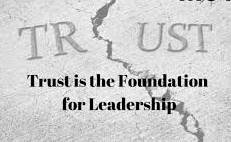Trust Doesn't Come with a Title...It Has to Be Earned

Trust is at the center of all relationships. In fact, I would go as far as to say that without trust, there is no relationship. One of the greatest leaders of our time, Jack Welch, made the statement in a recent interview that there are two principles of successful leadership today, truth and trust. When trust is violated, our relationships both personally and with our business associates become strained. And if it is violated, it is extremely difficult to restore. Think about the impact of high trust or a lack of trust on our ability to lead others or on our willingness to follow others. When I completely trust what a leader says as demonstrated by what he/she does, my level of engagement goes through the roof and I’ll take the hill for him/her.
Notice that I said that if I COMPLETELY trust a leader, I will become fully engaged. Trust is not an absolute. There are degrees of trust and the degree of trust dictates the strength of a relationship. Try this simple exercise. Think of 10 people that you work with and interact with on a daily basis. Now identify 5 of those that you feel you can trust. Now in sequential order, ask yourself if you would trust these people with the following:
- A task
- Your money
- A secret
- Your career
- Your children
- Your spouse
- Your life
You’ll notice that as you go through the list, the consequences of a violation of trust become more personal and more severe. Those in the military trust each other with their lives when in the heat of battle. That’s a different relationship and level of trust than simply delegating a task to someone and trusting that they will complete it.
A leader does not gain trust from those he/she leads by virtue of the title. They may get compliance and obedience, but not trust. Trust must be earned. So how do you earn it?
1. Do what you say you’re going to do when you say you’re going to do it:
You’ve heard the saying that the road to hell is paved with good intentions. When following a leader, people need to know that they can count on that person to do what he/she says he/she is going to do.
2. Be open and honest:
We can take bad news much better than we can take a distortion of the truth. We are not naïve in thinking that everything always goes right or goes our way. But openness and honesty from a leader creates trust and allows us to deal with both good and bad news appropriately.
3. Be consistent over time:
Have you ever worked for someone for whom you had to test the temperature or mood of the day before approaching him/her? When I was a young accountant, I remember working for a controller whose moods changed with the weather. I remember making conscious decisions NOT to share bad information with him on his down days. In cases like this, bad news becomes disastrous news when employees cannot trust their leaders to be consistent in how they interact with others.
4. Admit what you don’t know:
No one knows it all. And it’s hard to trust someone who acts like they do. Have you ever shared something with someone and before you even complete your thought, you’re getting an “I know” response? It’s hard to trust someone who has all the answers. Be forthright in what you do know and admit what you don’t.
5. Be vulnerable:
We all deal with challenges and issues. It’s hard to trust someone who acts like they have never made mistakes or faced the same situations that you have. . In addition to building trust, a benefit to being vulnerable is that you come up with better solutions to problems and challenges when you’re vulnerable enough to admit that we’re all in this together.
6. Look for win/win solutions:
In a scenario in which someone has to win and someone has to lose, trust is an evasive goal. If my wife wants to go to a party and I don’t, there is a much stronger chance of increasing trust if we work towards a compromise solution. We’ll go, but we won’t stay long.
7. Use direct and concise responses:
Did you ever get a long response from a leader and after reading it 2-3 times, still not know what he/she is saying? One of the best leaders I ever worked for always responded with a clear yes, no, or let’s talk about it when I posed a question. I never had to guess what his intent was and it built a tremendous relationship based on trust.
8. Most importantly, align actions with words:
If how you behave or act does not align with what you say, trust is destroyed instantaneously. And remember, when trust is destroyed, it’s very difficult, if not impossible to restore.
Trust is at the center of all relationships. And the deeper the trust, the deeper the relationship. And the deeper the relationship, the higher level of engagement a leader can achieve with those he/she leads.
